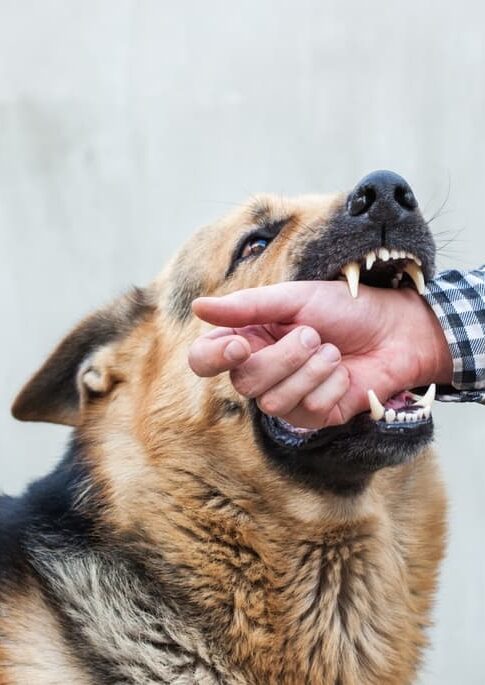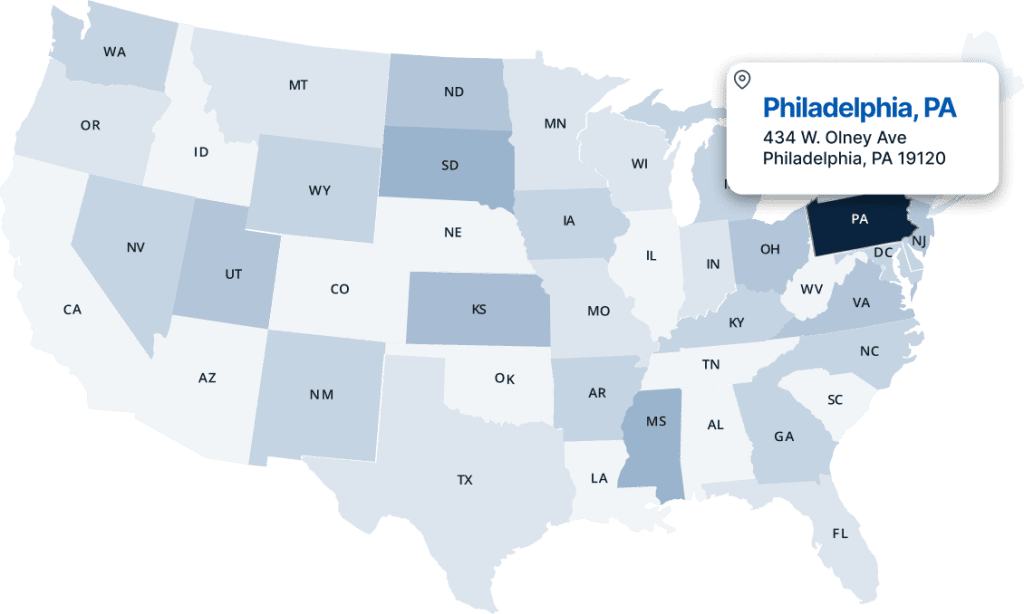Home » Dog Bite Lawyers » Georgia Dog Bite Lawyer » Atlanta Dog Bite Lawyer
Dog bites can leave you with serious injuries, expensive medical bills, and even long-term trauma. In Georgia, dog owners are responsible when their negligence leads to an attack. That means you could deserve compensation for your injuries, lost wages, and suffering.
At TopDog Law, our network of local attorneys helps victims get the justice they deserve. Call (404) 620-4059 today, and we’ll connect you with an experienced Atlanta dog bite lawyer who knows how to fight for your rights.



Dog attacks cause a wide range of injuries, and they aren’t limited to a single bite. When a dog latches on, it can drag someone down, shake them violently, or attack multiple areas in seconds. Some of the most common injuries include:
The physical injuries are bad enough, but many victims also deal with post-traumatic stress disorder (PTSD), anxiety, and a lifelong fear of dogs. Children, in particular, struggle with emotional trauma after an attack.
Georgia holds dog owners responsible when their negligence leads to an attack, but the law has some quirks. Unlike strict liability states, Georgia follows a modified one-bite rule (O.C.G.A. § 51-2-7), meaning a dog owner isn’t automatically liable unless:
However, Georgia law doesn’t protect reckless behavior by victims. If someone provokes a dog—by hitting it, taunting it, or trespassing on private property—the owner may argue that the victim shares fault under Georgia’s comparative negligence rule (O.C.G.A. § 51-12-33). If the victim is found 50% or more at fault, they can’t recover compensation.
In some cases, responsibility extends beyond the dog owner. Landlords and property managers may be liable if they knew a tenant had a dangerous dog but did nothing to remove it. Homeowners can also face liability if they knowingly allow a dangerous dog onto their property without proper restraints.
Georgia law allows victims to pursue compensation, but the amount depends on the severity of the injuries, the circumstances of the attack, and the long-term impact on the victim’s life.
Dog bite injuries come with a price tag. Some people bounce back after a quick trip to urgent care. Others need surgery, physical therapy, or months of treatment to regain full function. These out-of-pocket expenses fall under economic damages, which typically include:
These damages are straightforward. They come with receipts, bills, and employer verification. But the financial losses only tell half the story.
Some injuries don’t show up on a medical chart. A scar might heal, but the emotional trauma lingers. Non-economic damages compensate victims for the personal impact of the attack, including:
Georgia doesn’t cap non-economic damages in personal injury cases, meaning a skilled attorney will argue for full compensation based on the long-term impact of the injuries.
Most dog bite claims focus on compensation for the victim’s losses. But in extreme cases, Georgia courts award punitive damages (O.C.G.A. § 51-12-5.1) to punish the dog owner for gross negligence. These cases involve situations like:

Atlanta’s dense neighborhoods mean dogs and people share tight spaces. A short walk down the street can turn dangerous when an unrestrained dog charges through an open gate or breaks free from a leash. Some of the most reported dog bite incidents occur in:
Atlanta’s leash law (Atlanta Code of Ordinances § 18-153) requires dogs to be restrained in public spaces, yet unleashed dogs remain a problem in many neighborhoods. Owners who violate this law face liability if their dog attacks someone.
Atlanta has no shortage of green spaces, but not all dogs play nice. Off-leash areas exist, but some owners ignore the rules and let their dogs roam outside designated zones. Common hotspots for incidents include:
Even in off-leash areas, owners remain responsible for their dog’s actions. If a dog attacks someone inside a park, the owner is still liable for any injuries under Georgia’s dog bite statute (O.C.G.A. § 51-2-7).
Dog-friendly restaurants, breweries, and retail stores attract pet owners who want to bring their four-legged friends along for the experience. While most businesses require dogs to remain on a leash, not all owners follow the rules.
Common locations where dog bites occur in commercial settings include:
Postal carriers and delivery drivers experience more dog bites than almost any other profession. The USPS ranks Atlanta among the top cities for dog attacks on mail carriers. FedEx, UPS, and Amazon drivers also face aggressive encounters, particularly in:
Georgia allows workers’ compensation claims for employees bitten on the job, but they may also sue the dog owner for additional damages if negligence played a role.
Homeowner’s insurance, renter’s insurance, and even certain business policies cover dog attacks. But insurers don’t stay in business by handing out big checks. Their job is to protect their bottom line, and they use every trick in the book to pay as little as possible.
The first offer arrives fast—too fast. Insurers push early settlements before victims grasp the full extent of their injuries. The number might cover an ER visit, but not ongoing treatment, lost wages, or permanent scarring. Once a deal is signed, there’s no renegotiating.
Georgia’s comparative negligence rule reduces compensation if the victim shares fault. Insurers exploit this, arguing:
Adjusters act like medical experts when it benefits them. If a bite doesn’t require surgery, they argue it isn’t serious enough for major compensation. They also claim:
Medical bills stack up. Lost wages hurt. Insurers drag their feet, hoping victims get desperate enough to settle for less. Calls go unanswered, new paperwork requests appear, and the process stretches until the victim folds.
Insurance companies don’t get the final say. A strong case—built on medical records, witness testimony, and Georgia’s dog bite laws—forces them to pay what’s owed or risk a courtroom loss.
Georgia law holds negligent dog owners accountable, but getting fair compensation takes more than just knowing your rights. It takes the right lawyer.
At TopDog Law, our network of attorneys knows how to handle these cases. Call (404) 620-4059 today, and we’ll connect you with an experienced Atlanta dog bite lawyer who will fight for what you deserve.

TopDog Law is known for its relentless pursuit of justice. Our experienced team fights tirelessly to secure maximum compensation for our clients, ensuring every case is handled with dedication and determination.
We understand the emotional and financial toll that personal injuries can take. That’s why we prioritize open, compassionate communication and provide tailored support throughout the legal process. With free consultations and a contingency fee model, you won’t pay a dime unless we win your case.
With TopDog Law on your side, you can rest assured that you have a tenacious, experienced team fighting to get you the compensation you deserve, no matter where you’re located.

TopDog Law is a national marketing network for law firms, including Helm Law Group, LLC, which license the TopDog Law name and separately operate in states where they are each licensed. James Helm is licensed to practice in Arizona and Pennsylvania. Helm Law Group, LLC operates in Arizona.
3225 Cumberland Blvd, Ste 100
Atlanta, GA 30339
1 South St, Suite 2125A
Baltimore, MD 21202
950 22nd Street N. Suite 600
Birmingham, AL 35203
2101 Corporate Blvd NW #410
Boca Raton, FL 33431
361 Newbury Street, 3rd Floor
Suite 310
Boston, MA 02115
305 E 204th St.
Bronx, NY 10467
215 E 5th St, Unit 1 Suite 400-3
Brooklyn, NY 11218
1207 Delaware Ave, Suite 012
Buffalo, NY 14209
101 N Tryon St. Suite C
Charlotte, NC 28246
6343 S Western Ave.
Chicago, IL 60636
2215 E 9th St, Suite A
Cleveland, OH 44115
4750 44th Place, Suite 120-P23
Phoenix, AZ 85040
1300 S Polk St Suite 295B
Dallas, TX 7522
66 S Logan St Suite B
Denver, CO 80209
645 Griswold Street, Suite 1309
Detroit, MI 48226
2925 Richmond Ave., Suite 1560A
Houston, TX 77098
863 Massachusetts Ave 2nd floor Suite B
Indianapolis, IN 46204
317 E Capitol St suite 200C
Jackson, MS 39201
1505 Dennis Street, 1st Floor, Office 102
Jacksonville, FL 32204
759 Parkway St Suite 202,
Jupiter, FL 33477
1701 Troost Ave suite 202b
Kansas City, MO 64108
800 South Gay Street
Knoxville, TN 37902
#8 Shackleford Plaza, Suite 304
Little Rock, AR 72211
8124 W 3rd St, Suite 201
Los Angeles, CA 90048
3385 Airways Blvd Unit 301F
Memphis, TN 38116
1840 Pyramid Pl Suite 321
Memphis, TN 38132
1433 N Water St Suite 400D
Milwaukee, WI 53202
201 St. Charles Ave, Suite 2500, Office 2544A
New Orleans, LA 70170
600 Mount Prospect Avenue, Suite A
Newark, NJ 17104
66 Franklin St, Suite 300C
Oakland, CA 94607
5627 Germantown Ave Suite 420
Philadelphia, PA 19144
2700 N Central Ave Suite 320B
Phoenix, AZ 85004
10000 N 31st Ave Suite D304L
Phoenix, AZ 85051
6425 Living Place, Suite 200B
Pittsburgh, PA 15206
1917 Bull St
Savannah, GA 31401
4625 Lindell Blvd Suite 200 & 300C
St. Louis, MO 63108
400 N Ashley Dr Suite # 1900
Tampa, FL 33602
5055 E Broadway, Suite C215-228
Tuscon, AZ 85711
1150 Connecticut Ave NW, Suite 802B
Washington, DC 20036
6832 W North Ave Suite 2A
Chicago, IL 60707
515 N Flagler Dr
West Palm Beach, FL 33401
3509 Haverford Ave, Suite 102
Philadelphia, PA 19104
Copyright 2026 All Rights Reserved © TopDog Technologies, Inc. and Helm Law Group, LLC
403 Olde House Lane Media, PA 19063

Existing clients can call (877) 541 1203 if you have questions about your case.